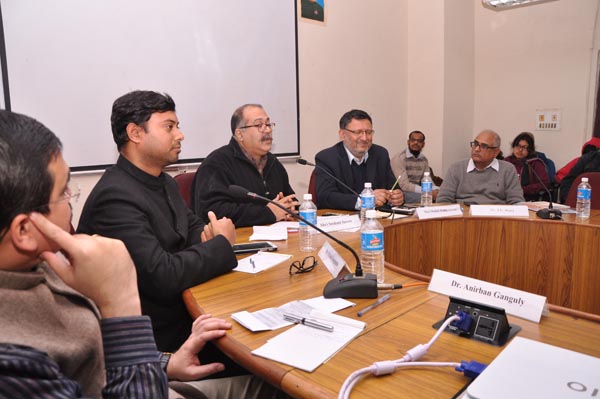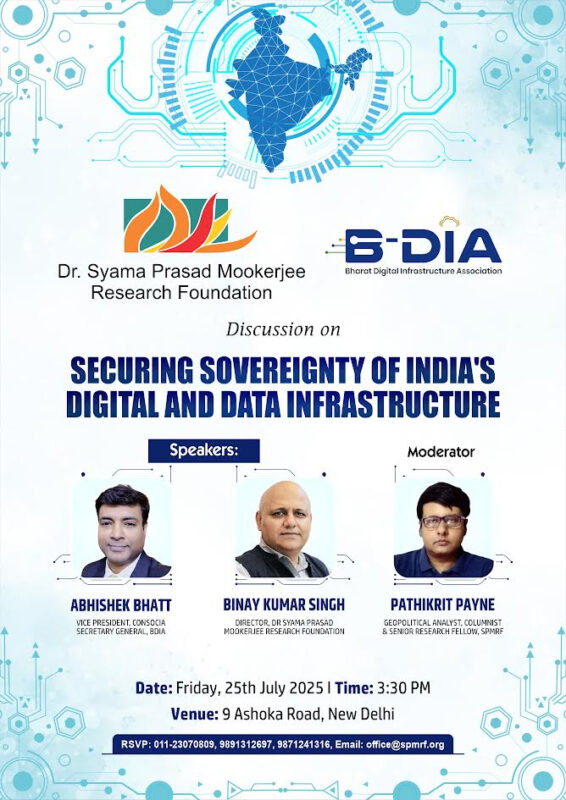Discussion on “Changing Paradigm Under the new Regime: Tracking the Performance of the Government in the Last 6 Months”: A Report
Dr. Syama Prasad Mookerjee Research Foundation (SPMRF) in association with India First, JNU, organized a discussion on “Changing Paradigm Under the new Regime: Tracking the Performance of the Government in the Last 6 Months” on 3rd February, 2015 at the School of International Studies, Jawaharlal Nehru University, New Delhi. The discussion focused mainly on the deliverance of the government in the last 8 months of its functioning and the way it is taking its various policies forward. The panelists were Dr. J. K. Bajaj, Director, Centre for Policy Studies, Shri Shakti Sinha, Retd. IAS, Former Power and Finance Secretary, Govt. of Delhi, Shri Sushant Sareen, Senior Strategic Expert, and Mr. Hindol Sengupta, Editor-at-Large, Fortune Magazine. The session was moderated by Dr. Anirban Ganguly, Director, Dr. Syama Prasad Mookerjee Research Foundation.
The discussion started with Shri Shakti Sinha throwing light on the importance of the newly constituted NITI Aayog. Shri Sinha took the audience to the history of Planning Commission and how the then government, while constituting the Planning Commission, reduced the role of Finance Commission which is a constitutional body. He cited many incidents and policy failures that happened while the Planning Commission was in action. With the passage of time government structures, processes, policy development approaches, role of states in planning and implementation of schemes, involvement of people in governance etc needed substantial transformation. NITI Aayog has tried to address all these issues with a refreshingly fresh perspective.The establishment of the NITI Aayog is possibly the most significant decision of the Modi Government that has the potential to transform India’s growth story, and unleash the very substantial potential of the Indian people, which alone is the raison d’être of the Indian State Shri Sinha said.
Dr. J.K. Bajaj critiqued the Nehruvian ‘Idea of India’. He said that Nehruvian India of India had an antipathy towards India’s Cultural and Civilizational past. Dr. Bajaj also recollected how Nehru’s government failed on the economic front and how during the green revolution the focus was on the input rather than the output. Dr. Bajaj also pointed out how the need to tackle the food issue was overlooked by previous governments and how this government has the strength and the potential to take our energy need and our food situation to greater heights. While referring to an affirmative approach to our indigenous and civilisational roots, Dr. Bajaj also said that it is for the first time that the people are not shy of their religious and cultural affiliation.
Shri Sushant Sareen focused on the performance of the government on the national security (internal as well as external), on diplomatic front and external affairs. With the recent developments in foreign affairs by the Modi government he was sure that the government is moving in the right direction. He commented on how Modi played a masterstroke by inviting all the SAARC leaders in his swearing-in ceremony and emerged as a strong leader of South Asia. He also talked about Modi’s visit to USA and Australia and meeting with world leaders at G-20 and United Nations General Assembly. He was positive about India’s relations with China and said that India doesn’t have a civilizational problem with China unlike other neighbours. He recalled how Mr. Modi cordially met the Chinese President even when there was a tension on the India-China border. About Afganistan he was critical of the past government which failed to establish a favourable relationship with Afganistan and suggested that the new government should wait till an apt time comes to work with Afganistan. About Pakistan he said that the government has taken a strong step and it should stick to it. On the issue of Kashmir, he endorsed the government’s policy which was that if Pakistan talks to separatists then India would deny any diplomatic talks with it. He reaffirmed that the Modi government should stick to this policy irrespective of the time it takes. In the meanwhile, any tension created by Pakistan on the border should be answered in the same manner as the Modi government has been responding in the last few months.
Shri Hindol Sengupta focused mainly on economic initiatives taken by the Modi government. He argued that the new government was focusing on enabling the poor so that poverty could be overcome. Shri Sengupta said that to overcome the problems of poverty India must encourage entrepreneurship and that was being energetically done by this Government. He delineated how the so called informal/unorganized sector contributes more than 50 percent to the GDP of India and also generates around 3-4 times the jobs generated by the organized corporate sector. He lauded the government’s new policy of ‘Make in India’ and said that this policy has the potential to strengthen the informal sector and the MSMEs. He also said that among other things entrepreneurship is an important weapon for OBCs and Dalits to break the caste barriers and be a part of the mainstream society.
In conclusion, all the panelists unanimously appreciated the Swachh Bharat Abhiyan initiated by the current Modi-led government and said that if properly followed, the initiative will go a long way in improving the healthcare scenario in the country and would lessen the burden of the government on healthcare and sanitation and promote healthy living.
The session ended with comments and question & answers session and a vote of thanks.
*Report prepared by Shubhendu Anand Research Associate with SPMRF.
(The views expressed are the author's own and do not necessarily reflect the position of the organisation)


